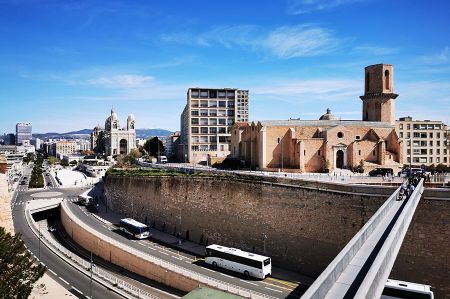Marseille Commandery – opening of a Templar church?
- Written by Portal Editor
On the way to the port of Marseille via the fortress, we saw the church of St. Laurent and right at the entrance two gentlemen dressed like Templars (although without a sword like the Knights of the Templar Order) received the seemingly few visitors.
The two Templars alone aroused our interest, especially since one of the gentlemen gave us a friendly wave as we approached. Of course, we were also interested in the church building itself, because the church was built in 1150 from pink stone from La Couronne in the simple Romanesque style of Provence and was then consecrated to Saint Lawrence of Rome.
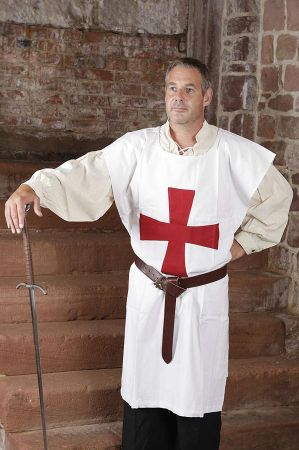 Originally there was a Greek temple at the site from the time the city of Massilia was founded and later a fortification built by Bishop Babon in 870, as became apparent during excavations in the immediate area. In the 17th century the church was redesigned, the side chapel of Ste-Catherine was added and the octagonal tower was built.
Originally there was a Greek temple at the site from the time the city of Massilia was founded and later a fortification built by Bishop Babon in 870, as became apparent during excavations in the immediate area. In the 17th century the church was redesigned, the side chapel of Ste-Catherine was added and the octagonal tower was built.
During the Second World War it was badly damaged when the German occupiers blew up the old town in 1943 and has only recently been restored. We were particularly struck by the sparse decoration and simplicity of the church, in complete contrast to the “magnificent gold-laden cathedrals” of other faiths.
Only two statues made of painted and partly gilded wood from the late 18th century show the Mother of God and Saint Laurent. The church also contains a large number of numbered floor slabs which were originally gravestones.
Founding of the Templar Order in Jerusalem
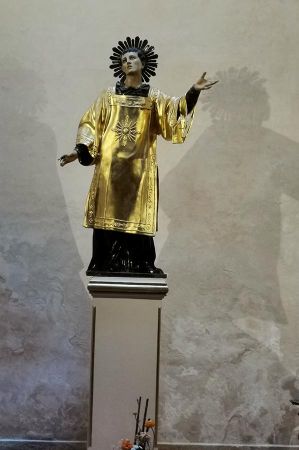 The Knights Templar order was founded in Jerusalem in 1119 after Crusaders conquered the holy city in 1099. At that time, securing pilgrims' routes along and through the Holy Land was a top priority.
The Knights Templar order was founded in Jerusalem in 1119 after Crusaders conquered the holy city in 1099. At that time, securing pilgrims' routes along and through the Holy Land was a top priority.
In his time, this task was entrusted to the Templar Order, whose monks had internalized prayer as well as fighting with the sword.
In the middle of the 12th century, the Knights Templar received large lands in Provence and on the Larzac Plateau from the King of Aragon in gratitude for their services. However, the brothers also ran a lively arms trade from their religious headquarters.
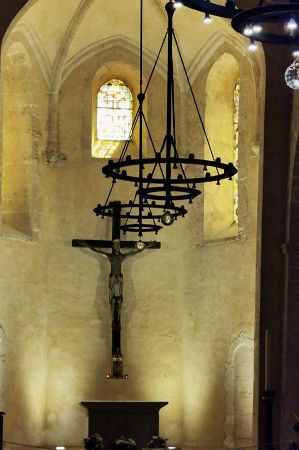 In addition, they worked as moneylenders who financed pilgrimages to Jerusalem at high interest rates. These activities brought the Order of the Knights Templar enormous fortune. With the wealth grew the power, which King Philip IV, known as "The Handsome", saw himself increasingly threatened by at the beginning of the 14th century. In 1307 he wiped out the order and confiscated all of its assets.
In addition, they worked as moneylenders who financed pilgrimages to Jerusalem at high interest rates. These activities brought the Order of the Knights Templar enormous fortune. With the wealth grew the power, which King Philip IV, known as "The Handsome", saw himself increasingly threatened by at the beginning of the 14th century. In 1307 he wiped out the order and confiscated all of its assets.
According to old legends, a member of the Knights Templar is said to have hidden in a cave just a walk from the Provençal ruined village of Châteauneuf. It is not known what became of the monk and whether his game of hide-and-seek had anything to do with the legendary treasure of the Knights Templar or the Holy Grail.
Until the Middle Ages, the Templar Order had numerous communities in which members of the order lived. Those who came served not least to finance the fight of the knights against the Muslims. As in other orders, the branches were grouped into regional provinces. Commandery of Marseille
Importance of the port of Marseille for the Templars
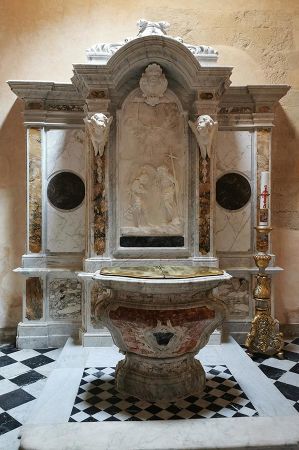 Marseille and its port were of strategic importance to the knightly orders in Provence, although the city was not the only port. By the 13th century at the latest, the Templars had also stationed a Commendator navis or Magister Passagium in Marseille. In 1212 the Templars were promised exemption from port taxes, which (just as with the Knights of St John) led to considerable quarrels with the city authorities over the loss of income.
Marseille and its port were of strategic importance to the knightly orders in Provence, although the city was not the only port. By the 13th century at the latest, the Templars had also stationed a Commendator navis or Magister Passagium in Marseille. In 1212 the Templars were promised exemption from port taxes, which (just as with the Knights of St John) led to considerable quarrels with the city authorities over the loss of income.
It was not until 1233 that the city reached an agreement with representatives of both orders that each would be allowed to have two ships sail to the Orient each year, regardless of goods and crews for their own needs. But in 1246 and 1247, Pope Innocent IV had to warn the Marseille Commune three times to let the Templars load their ships unmolested. Unfortunately, the total loss of the order's archives in Marseille does not allow any statement to be made about the origins of the religious houses there and also leaves many of the commercial and financial activities of both orders in the dark.
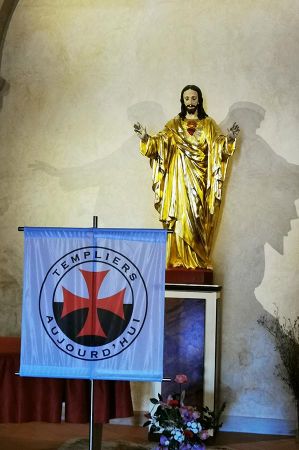 Ships under the command of the Templar Order were stationed in Marseille to support pilgrimage traffic. The “Bonne-Aventure” around 1248 and the “Rose” around 1290 are known by name. However, it cannot be proven whether the orders were actually the owners of the ships or had just rented them for their purposes.
Ships under the command of the Templar Order were stationed in Marseille to support pilgrimage traffic. The “Bonne-Aventure” around 1248 and the “Rose” around 1290 are known by name. However, it cannot be proven whether the orders were actually the owners of the ships or had just rented them for their purposes.
Marseille traders initially used Knights Hospitaller or Templar ships primarily to transfer money to the Orient. In the preparation of various pilgrimages and crusades on a large and small scale, representatives of the Hospitallers and Templars from the religious houses of Marseille often acted as financial negotiators or acted as guarantors for the proper equipment of commissioned ship equipment.
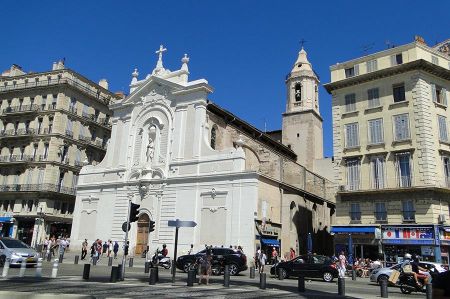 The Templars also had a branch and a church in the Ville Vicomtale right in the harbour, on the site of the current 15th-century church of St-Ferreol, and, according to a statement from the trial files against the order from the beginning of the 14th century suggests also a smaller property with a chapel 'in quadam insula prope Massiliam'.
The Templars also had a branch and a church in the Ville Vicomtale right in the harbour, on the site of the current 15th-century church of St-Ferreol, and, according to a statement from the trial files against the order from the beginning of the 14th century suggests also a smaller property with a chapel 'in quadam insula prope Massiliam'.
Please read as well:
A destination: Lechtal when the lady's slipper is blooming
Savon de Marseille – the soap makers of Marseille
-
 Templer-Church in Marseille
Templer-Church in Marseille
Templer-Church in Marseille
Templer-Church in Marseille
-
 Templer-Church in Marseille
Templer-Church in Marseille
Templer-Church in Marseille
Templer-Church in Marseille
-
 Templer-Church in Marseille
Templer-Church in Marseille
Templer-Church in Marseille
Templer-Church in Marseille
-
 Templer-Church in Marseille
Templer-Church in Marseille
Templer-Church in Marseille
Templer-Church in Marseille
-
 Templer-Church in Marseille
Templer-Church in Marseille
Templer-Church in Marseille
Templer-Church in Marseille
-
 Templer-Church in Marseille
Templer-Church in Marseille
Templer-Church in Marseille
Templer-Church in Marseille
https://www.alaturka.info/en/france/marseilles/6602-marseille-commandery-opening-of-a-templar-church#sigProIdd77351a3f9
